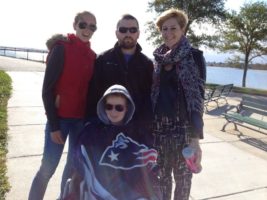Written by Erin Dailey
 On June 3, 2013, Lisa Fish of West Newbury, MA was 25 years old and reminiscing on a great weekend attending two of her friends’ weddings in South Boston. However, everything took a turn for the worst when she began to endure one of the worst headaches she has ever felt, even causing her to throw up from the pain. She tried everything to relieve the headache to no avail. As her husband tried to help her walk to the bedroom to lie down, she passed out, so he immediately called 911.
On June 3, 2013, Lisa Fish of West Newbury, MA was 25 years old and reminiscing on a great weekend attending two of her friends’ weddings in South Boston. However, everything took a turn for the worst when she began to endure one of the worst headaches she has ever felt, even causing her to throw up from the pain. She tried everything to relieve the headache to no avail. As her husband tried to help her walk to the bedroom to lie down, she passed out, so he immediately called 911.
Lisa was rushed to Tufts Medical Center where they learned that she suffered a hemorrhagic stroke from an arteriovenous malformation (AVM) in her brain. The doctors put special glue in the blood vessels in her brain to stop it from bleeding and eventually added a shunt for the excess fluid. She was in a coma for 2 months; a combination of both her own body going into a coma and the doctors putting her into a medically induced coma to let her brain rest and heal.
When Lisa finally woke up, she had no recollection of anything that had happened. She knows that she went to the weddings right before the incident, but does not remember anything from those two days, along with about 6 months of her life. She is still working on her short-term memory to this day, attending therapy classes for memory learning. During memory learning class she participates in activities such as walking around outside to work on navigation, along with different outings. Lisa loved to cook before her accident, so she has been on outings to the grocery store to find the ingredients for one of her meals and she must make sure she can find everything and be able to calculate the price before checking out.
Fortunately, Lisa was not paralyzed from the stroke. However, she suffered from muscle weakness in the beginning stages of recovery and used a wheelchair because she would get exhausted very quickly. She also had to relearn how to do almost everything. She relearned how to eat, walk, talk, and perform daily tasks that people normally take for granted. She traveled to many hospitals and specialists over the region to receive the care she needed.
The hardest part for Lisa was that there were no signs that could have predicted this would happen. The signs of a stroke can be remembered by F.A.S.T (face drooping, arm weakness, speech difficulty, and time to call for help). Lisa did not suffer from any of these symptoms, and the doctors believe that she was born with the malformation (AVM) and there was nothing she could have done to prevent the bleed as she had no symptoms prior to the rupture.
Lisa is still not completely back to her normal life; she still is working on her memory every day and is not able to drive. However, she has made insurmountable progress since her stroke in 2013; she can now walk, talk, and eat normally. Lisa is grateful and owes so much to her family, friends, and therapy to help her get to where she is today. They never gave up on her and helped her through the darkest of days, encouraging Lisa to keep persisting. “The most important message is to have faith because it will get better. It was a very daunting experience, but there are better days to come.” Lisa explained.
Lisa plays pickleball and tennis every week and continues to attend the Krempels Center. The Krempels Center is a nonprofit in New Hampshire that is dedicated to helping survivors of brain injury. “I wish more people knew about the Krempels Center. It is an amazing place that helps so many people,” said Lisa. Lisa was a Pediatric ICU nurse before her stroke, so she is passionate about helping others in any way she can, which is why she is eager to share her story with the American Stroke Association to help raise awareness about strokes and how they can happen to anyone at any age.